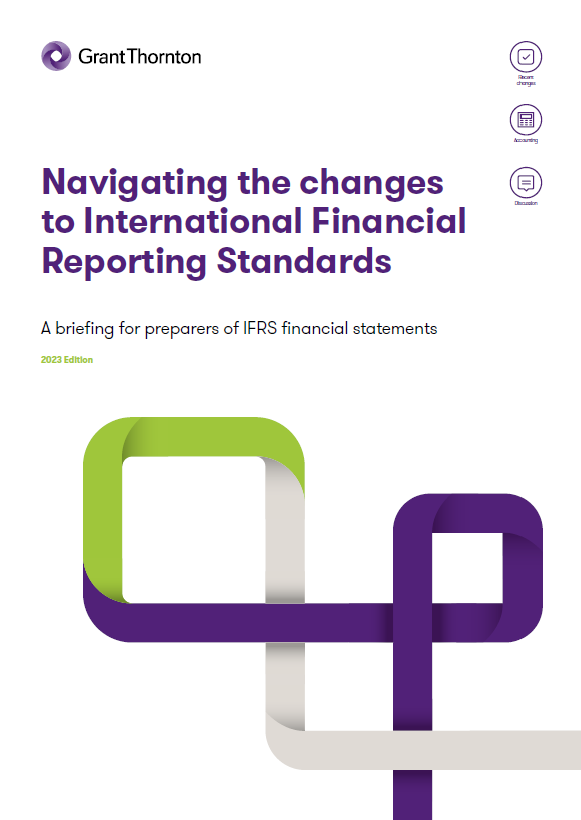-
Audit methodology
At Grant Thornton, we use a single audit methodology across our global network. This means that our clients gain the same proven, high-quality approach wherever they are.

-
Financial statements and consolidated financial statements
Preparation of monthly, quarterly or annual report and consolidated report on the basis of information presented by the client.
-
Financial Accounting
Effective bookkeeping and financial accounting are essential to the success of forward-thinking organisations. To get the optimum benefit from this part of your business, you'll need an experienced team behind you.
-
Tax compliance
Tax is likely to have an impact on almost every business decision you make. Whatever your business’s specific needs, we respond quickly and devise solutions tailored to you. We perform VAT, income tax, social tax and other tax accounting as well as present tax declarations to the tax authorities.
-
Chief financial officer service
Chief Financial Officer services include the periodic reporting, information systems standardization, internal document management and information flow optimization, budget preparation, cost accounting, cash flow and working capital management, financial analysis, investment return evaluation for managers.

-
International taxation
Grant Thornton operations in the Baltic States give us an access to the international expertise and allow advising the client on the minimisation of tax risks arising from conducting business in a foreign tax jurisdiction. We also consult foreign investors in finding an optimum group structure and form of enterprises in Lithuania and other Baltic States.
-
Transfer pricing
We advise the management bodies of local and multinational groups of companies in issues concerning transfer pricing of intra-group transactions and, if necessary, in the preparation of the relevant compliance documents. We also assist in preparing transfer pricing policies in order that future transactions are priced in accordance with the local as well as international regulations.
-
VAT refunds
We advise foreign clients in issues concerning the refund of value added tax paid in Lithuania, and Lithuanian clients – in the refund of value added tax paid in the EU member states. If necessary, we carry out these procedures on behalf of the client.
-
Profit tax, tax incentives
Our tax advisory department consults local and international clients in both everyday and specific taxation issues related to business activities.
-
Due diligence
Making the right investment decision can have a significant impact on shareholder value. To make an informed investment decision and create the best value from the transaction you will need the following an understanding of the target business identification and understanding of key business drivers an understanding of all the relevant issues clear analysis, conclusions and recommendations.
-
Assistance and representation during tax investigations, inspections, disputes
We provide services for registration in the Register of Taxpayers and the Register of VAT Payers. We represent clients' interests in tax disputes at the State Tax Inspectorate, Tax Disputes Commission, courts and other institutions.

-
Legal advisory for business start
We assist to quickly establish a company, branch or permanent establishment in Lithuania, open a bank account, VAT registration and obtain all necessary licenses for activity.
-
Legal advisory for business development
Our team has gained the greatest experience in advising international companies on the management of groups of companies. We advise and implement reorganizations or liquidations. Together with a team of tax and financial advisors, we perform a comprehensive due diligence (tax, legal & financial).
-
Labor law for CEOs and employees
We provide modern labor law solutions for the CEO, C-level managers and employees, which are tailored specifically to your business industry. We will take care of well-judged employment contracts and benefits package, protection of confidential information and non-compete agreements, handling of employee data or stock option rules, posting of employees, employment of EU and third-country nationals, organization of telework.
-
Fintech
With extensive experience in money laundering prevention and compliance and a strong team of financial experts, we advise clients on financial services, electronic money, licensing of payment institutions, capital formation, listing of mutual lending platform operators and other operational issues.
-
Migration and relocation
We assist you, your family members and employees of the organization to obtain national and European Union (Schengen) visas, residence permits, e-resident status, provide mediation letters and ensure a smooth relocation to Lithuania.
-
Due diligence
Making the right investment decision can have a significant impact on shareholder value. To make an informed investment decision and create the best value from the transaction you will need the following an understanding of the target business identification and understanding of key business drivers an understanding of all the relevant issues clear analysis, conclusions and recommendations.
-
Fintech advisory
The rapidly changing world and evolving technology are driving the development of new business models such as acting as a payment institution, a provider of virtual currency services and a financial institution. Grant Thornton Baltic provides support and advice to these companies.
-
Corporate finance management
Building a successful business requires a clear vision backed by a focused strategy. To achieve this vision, businesses must negotiate an increasingly complex environment.
-
Business Valuations
Choosing the right valuation method is the most important element in the process of estimating the fair value of a business as it must be adequate in terms of the purpose and object of the valuation. Grant Thornton uses only proven and generally accepted methods from among the wide range of income, asset and market approaches. Having conducted a preliminary analysis of the object and purpose of the valuation, we identify the method that will be the most appropriate considering the situation and characteristics of a given enterprise and the business sector in which it operates. Prior to commencing valuation, we also identify the documents necessary in the process.
-
Mergers and acquisitions
We provide advice to clients in all material aspects of the process of conducting transactions: finding a candidate for buyer, purchase or merger, initial analysis and valuation, negotiations, due diligence, structuring transaction price, preparing legal documentation and formal closing of the transaction. We also provide consultation for management buyouts.
-
Protection of Interests of Bondholders'
Grant Thornton provides bondholders' advocacy and protection services. We have resources, knowledge and the latest technology. Defending the interests of bondholders · Representing the interests of bondholders
-
External Financial Management Services
Providing an external financial management services makes it possible to manage a company’s finance on a day-to-day basis by a competent economist, without the need of offering full-time employment. By cooperating with experts on managing big-budget projects, we provide our clients with excellent support in comprehensive management of company’s finance.
-
Training
Financial Management Training and Seminars. Our experts have significant regional competence and close co-operation with our global colleagues. They happily share their expertise with our clients.

-
Internal Audit Services for Financial Sector Companies Licensed in Lithuania
Internal audit services adapted to Lithuanian financial sector companies ensure compliance with regulatory acts, risk management and operational excellence.
-
Internal Audit Services for EU/Foreign Aid Projects
Internal audit for EU/foreign aid fund projects helps to ensure compliance of activities and related costs with requirements.
-
Internal Audit for the Companies Certified by ISO
Internal auditing ensures ISO standard compliance, evaluates management system effectiveness, and gathers objective evidence of performance.

New research from Grant Thornton reveals how mid-market businesses globally are failing to take adequate steps to protect their business against the threat of inflation. The research coincides with the release of Grant Thornton’s “Essential action plan for managing in inflationary times” and highlights that around three-quarters of businesses globally have not taken the actions we are recommending.
Grant Thornton experts have identified seven actions that businesses should be taking now to deal with the threat of inflation – or at least consider taking.
Global head of advisory at Grant Thornton International Ltd., Mike Ward, says: “This isn’t a list of everything companies could do, but it is the essential starter actions with maximum impact. The steps will help businesses get through this difficult inflationary period, and make them more resilient to any economic slowdowns, which is a real risk in the aftermath of inflation.”
“What is concerning is the fairly low proportion of companies that are taking the actions needed around inflation,” observes Mike. “Even the most popular actions are only being taken by around one-third of all mid-market companies. This is far too low. Companies need to be pulling all these levers now.”
The urgent need to act is plain for all to see. The research shows that key input costs are up nearly a fifth (19% on average) led by raw materials (up 21%), energy (up 20%) and transport costs (up 20%). Bank/interest costs meanwhile have surged 16% and tax bills have risen by 17%.
Businesses have been increasing prices in response. The research shows that 52% of business have increased prices in line with inflation, while a surprising 35% have increased prices above inflation. This is an extraordinary display of pricing power. The recent price increases have been supported by the particular combination of strong demand and supply shortages. These won’t last forever. Companies need to take a range of different actions to deal with inflation and can’t simply price their way out of this problem.
Andrew Webb, chief economist at Grant Thornton Ireland, says “sentiment about inflation shifted rapidly at the start of 2022 from being a transitory, predominantly supply chain and release of pent-up demand issue, to one that has taken a firmer grip. ‘Higher for longer’ now summarises the global inflation context.”
While only one-quarter of businesses may be taking each of the necessary actions, the good news is they are all steps that businesses around the world can take now to protect themselves.
The essential starter actions identified by Grant Thornton, which Mike says will have maximum impact are:
Action 1: Identify and mitigate the risks of inflation for your business
Action 2: Take action to limit external cost increases
Action 3: Outsource more activities to lower costs and ameliorate labour shortages
Action 4: Improve your understanding of the true cost to serve clients
Action 5: Change your pricing strategy so it is more in line with cost increases
Action 6: Take action to improve capital structure
Action 7: Take steps to improve internal efficiency and costs, and/or reduce waste
More detail on what’s involved in each action is available in the plan on Grant Thornton’s website. But outlined below is a brief description of each action.
Action 1: Identify and mitigate the risks of inflation for your business
Work across your business to identify where you are most exposed to inflation. Having identified your key risks, draw on the expertise within your business on how best to mitigate them. This isn’t something for one or two key executives to do in a darkened room. Inflation touches all parts of a business, and so “the best plans will include the most points of view,” says Mike.
Action 2: Take action to limit external cost increases
Actions here include locking in prices, bulk buying, renegotiating terms with suppliers or changing suppliers. In a high inflation environment these basic countermoves can really make a difference in limiting costs and protecting margins.
This can also impact inventory, working capital, storage space requirements, as well as important profit and tax implications when bulk buying through subsidiaries, which could lead to tax savings in addition to the mitigation of inflation.
Action 3: Outsource more activities to lower costs and ameliorate labour shortages
Outsourcing now offers more compelling benefits than ever for international companies looking to both lower costs and address the skills shortage, with many outsourcing partners having invested heavily in automation and developed new service models.
Businesses should also look at the current design of their processes and explore optimisation opportunities through a range of modern technological tools.
While relocating operations to lower-cost jurisdictions can help manage wage costs and inflation generally there can also be tax considerations will need to consider – especially for value-adding roles like R&D.
Action 4: Improve your understanding of the true cost to serve clients
Most mid-market companies around the world still don’t accurately and regularly calculate the costs and profits of individual customers that they serve. Yet customer segmentation provides critical information to help protect profitability by actively managing a business’s customer base.
Once the customer segments are clearly defined, the focus should be on understanding the cost to serve each respective segment.
Action 5: Change your pricing strategy so it is more in line with cost increases
Grant Thornton’s research shows some 52% of global companies have been increasing prices exactly in line with costs, and another 35% have been increasing prices more than costs.
This is an extraordinary display of pricing power. And it may be tempting for leaders to think they can rely on this in future. “Companies should still look at increasing prices, but they cannot just price their way out of this problem,” says Mike. “The recent price increases have been supported by the particular combination of strong demand and supply shortages. These won’t last forever. Companies need to take a range of different actions to deal with inflation.”
There are multiple factors to weigh up: existing contractual terms, timing of the increase, nature of historic increases, who the increases should apply to, whether you can link the increases to new features and customers’ willingness to pay.
How businesses engage with customers around price increases is also really important. Open communication is key, where you explain the pressures and try to work with customers to minimise the issues.
Action 6: Take action to improve capital structure
Companies need to optimise their costs of capital, and also look at scaling up or down the level of working capital to meet their needs. In the short-term, if businesses are healthy and have plenty of cash, then they can consider strategies like bulk buying to beat inflation. If the opposite applies, then they may need to look at sourcing additional capital and managing debt.
Banks will inevitably become more cautious about lending in this environment. Businesses may need to look at other providers and sources of capital and shop around.
Action 7: Take steps to improve internal efficiency and costs, and/or reduce waste
If you can do more with less, and cut down on the wastage, you may be able to offset the higher prices – and lower your environmental impact.
What really drives internal efficiency is technology. Automation, robotics and machine learning can all improve productivity by lowering output costs and allowing companies to deploy human capital more effectively.
Waste reduction is often a benefit of greater efficiency, but also deserves separate consideration. There are eight main types of waste including less obvious areas like underutilisation of skills, unnecessary movement of resources and time spent waiting. Some waste is unavoidable, but most is simply unnoticed or ignored. Addressing it can save business a lot of money.
International Business Report
The Grant Thornton International Business Report (IBR) is a survey of mid-market businesses. Launched in 1992, the IBR now provides insight into the views and expectations of around 10,000 businesses across 28 economies. Questionnaires are translated into local languages and fieldwork is undertaken on a biannual basis, through both online and telephone interviews. The data for this release is from interviews conducted between May and June with chief executive officers, managing directors, chairpersons or other senior executives from all industry sectors.
Subscribe to audit, accounting, tax, legal and business consulting news. Be the first to receive Grant Thornton Baltic news, expert advice, professional business insights and event information.

